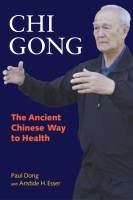Chi theory is an ontology, in which it is pointless to declare one’s belief or disbelief prior to understanding. In this excerpt from Chi Gong: The Ancient Chinese Way to Health, author Bruce Holbrook addresses the root of the controversy, which is neither logic or science, but cultural impedance.
The concept of chi is confusing to Western readers, not because it is a difficult one, but because our own culture stands in the way.
Occidental civilization is based on certain religious and philosophical premises which invite false translation of chi and related concepts. For example, our philosophy forces a choice between two fundamental levels of reality, which in the Chinese worldview are but a single one. That historically recent epistemological expression of our civilization, science, forcefully fights against comprehension of a single reality. Through out this section, therefore, “science” and related terms such as “physical,” are used within quotation marks when they refer to Western concepts. This may promote correction of the false, but very widespread, ethnocentric assumption that Western science is the only form of science.
Our “science” is firmly based on inanimate models and data-recording devices, whereas chi (in the central sense of this book) is intimately related to distinctively animate phenomena and cultivated human sensing. An additional problem is that Western science–especially “medical science”–has become dogmatic, so that it rejects any logical conclusion which lies outside its paradigm. The prevailing attitude is: If we can’t deal with it on our terms, it does not exist, because only our terms are valid. Cultural anthropologists call such systematic ignorance “ethnocentrism”–being confined, unaware of the confinement, by one’s own culture.
Western scientists can describe in unparalleled detail a decline in metabolic energy and regenerative capacity, but as soon as they state or suggest that these are the causes of natural dying, they are refusing to answer the question at hand: How does a human die of natural causes?
Given such widespread ethnocentrism, it is only natural therefore that Western thinking beyond the scope of “science” has surrounded chi with a mystical aura, while “scientific thinking” has reduced and deformed the concept into something manageable on its own terms. Such terms are untrue to the original concept and reality of chi. Beyond that there is a natural difficulty with distinctions among different kinds of chi. This can give rise to the impression that Chinese thinkers indulged in unnecessary conceptual multiplication to compensate for their own weaknesses in natural scientific understanding. Nothing could be further from the truth.

